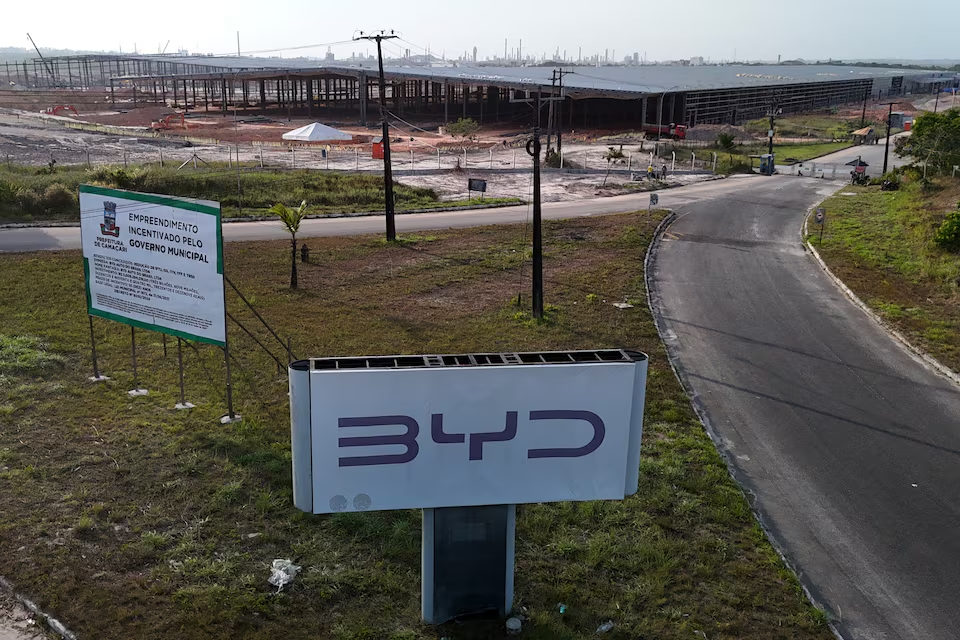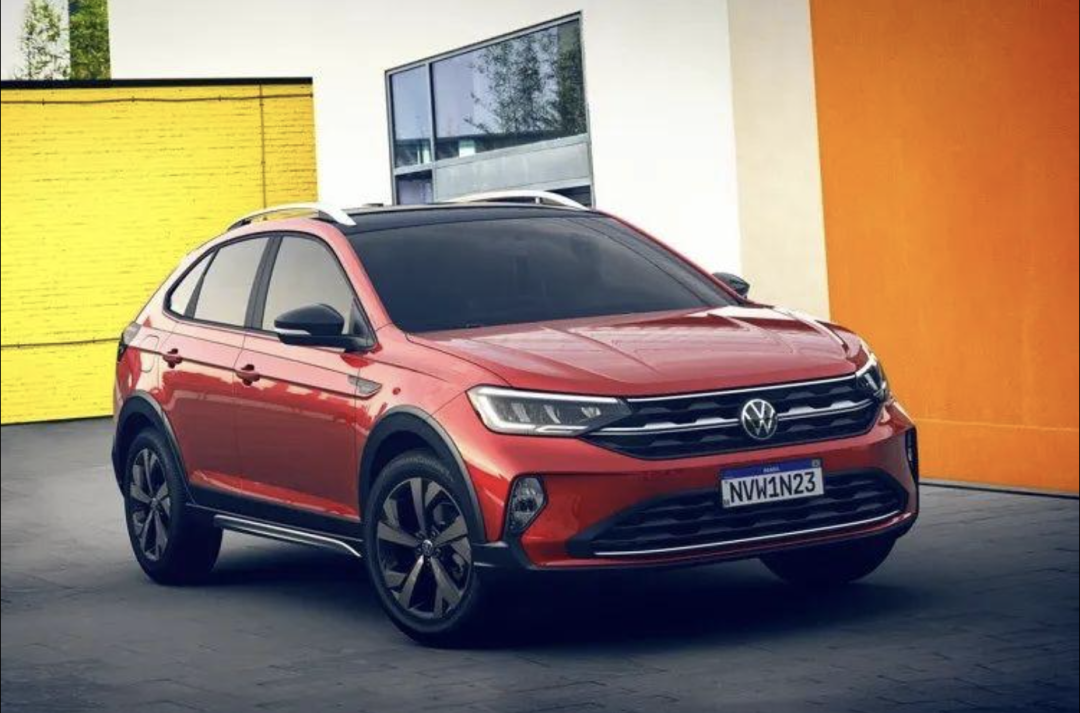Chinese Carmakers Compete Fiercely in Brazil
![]() 05/06 2025
05/06 2025
![]() 555
555

Author | Feng Ye
Editor | Li Xiaotian
As Trump continues his attempts to reshape the global supply chain, Chinese new energy vehicle (NEV) companies remain unperturbed.
Their resilience stems from their minimal reliance on the U.S. market. Early in the trade war, they proactively expanded into emerging markets such as the Middle East, Southeast Asia, and Latin America. Among these, Brazil, situated 18,000 kilometers from mainland China, has emerged as a hotbed of competition for NEV companies seeking overseas expansion in recent years.
Brazil ranks as the sixth-largest automobile market globally, with NEV sales consistently on the rise. According to data from the Brazilian Electric Vehicle Association (ABVE), approximately 80,000 new light electric vehicles were sold in Brazil from January to June 2024, marking a 146% increase compared to the same period last year. This positive trend is expected to continue throughout the year.
Chinese NEV companies have been pioneers in entering the Brazilian market. Today, it's common to see BYD vehicles on the streets of São Paulo and Brasilia. According to several Brazilian citizens, BYD's presence extends beyond major cities, penetrating rural areas around São Paulo, Belo Horizonte, Goiânia, and other lesser-known locations. "I've even seen many Uber drivers driving BYD Dolphin," remarked Brazilian citizen Pakozdy.
BYD isn't alone; Chery, Changan, Great Wall, JAC, and others are also well-established Chinese automotive brands in Brazil. Notably, JAC's product line in Brazil comprises 100% electric vehicles, a bold strategy that underscores its strong confidence in the Brazilian market.
While the scene of rapid expansion is promising, it's accompanied by complex real-world challenges. Despite robust sales, Chinese companies frequently encounter issues such as labor conflicts, inadequate charging facilities, and a lack of supporting industries in the supply chain. They also face stiff competition from established European and American automakers like Toyota and Volkswagen.
For Chinese brands aiming for long-term success, the overseas journey is never an easy path.

From a market perspective, BYD undeniably leads the pack in NEV sales in Brazil.
ABVE statistics reveal that in 2024, total sales of electric and hybrid vehicles in Brazil amounted to approximately 125,000 units, with BYD accounting for 61.2% of the market share, followed by Great Wall Motors and Volvo.
In a survey conducted by Xiaguang News, Brazilian citizens shared their insights. Felipe, a resident of Campinas, stated, "I already own a BYD hybrid vehicle. A dealership opened in my town, and BYD vehicles are everywhere on the streets. Around my apartment, I can see three to five BYD vehicles within every kilometer."
Brands like Chery, JAC, Great Wall, and Neta Auto have also entered the Brazilian market, but each brand occupies a unique position in the minds of local consumers.
After forming a strategic partnership with CAOA Group, Brazil's largest automobile manufacturer and distributor, in 2017, Chery has adopted a deeply localized approach, focusing on internal combustion engine and hybrid models rather than explicitly targeting the NEV sector. JAC entered the Brazilian market as early as 2009, with its current product lineup consisting entirely of pure electric vehicles. In terms of product lines, trucks, vans, and commercial vehicles represent its sales. Neta Auto, a newcomer in the NEV sector, entered the Brazilian market last year and is currently expanding through the dealer model. Great Wall's positioning is similar to BYD, both focusing on the passenger vehicle market. The Haval H6 hybrid model has been popular since its launch in 2023. A Brazilian citizen told Xiaguang News:
"A year ago, a friend and I saw car dealers promoting Great Wall's Haval and Ora at our company. We had never seen these cars before. One day, I spotted a Haval on the highway and took a photo. Later, we started a game where if one of us saw a Haval, we would take a photo and send it to the other. Now we see Havals every day."
The popularity of Chinese NEVs in Brazil exceeds imagination, closely tied to local policy support.
As early as 2018, the Brazilian federal government initiated the "Rota 2030" plan, aiming for "electric vehicle sales to account for 30% of total automobile sales in Brazil by 2030." Various policies were issued to encourage electric vehicle and component research and development. Last year, the Brazilian federal government launched a revised version of the "Green Rota 2030" plan (also known as the "Mover" plan), expected to provide tax incentives totaling 19 billion reais by 2028, focusing on promoting sustainable development in the automotive sector.

Brazilian Streetscape
In recent years, the close cooperation between China and Brazil has fueled the wave of Chinese companies expanding into Brazil. At the G20 Summit held in Rio de Janeiro last November, coinciding with the 50th anniversary of diplomatic relations between China and Brazil, both countries recognized the goal of collaborating to create the next "golden half-century."
However, cooperation between major countries emphasizes mutual benefits. Brazil's insufficient local industrialization foundation means that merely engaging in import business could hinder the development of the local automobile industry. Consequently, Brazil has established a tiered import tariff system for NEVs, implemented in phases since July last year. By July 2026, the relevant tariff rate is expected to rise to 35%. In the first four months of 2024, China's exports of passenger vehicles to Brazil increased by 372.4%, totaling 762 million USD—this can be seen as the final surge before the tariffs took effect, as exports have since contracted since June last year.
This measure also signifies Brazil's desire to attract more automakers to establish local factories, exchanging market access for technological advancements. Besides Chinese companies, multinational automakers such as General Motors, Volkswagen, Hyundai, Toyota, and Stellantis have also announced investments in Brazil, making it a key battleground for NEVs.

Seeing Chinese NEVs on Brazilian streets is akin to spotting Teslas in China. The roads are a mix of technologically advanced, brand-new NEVs and older fuel vehicles that entered the local market earlier, creating a stark contrast.
This observation was made by Liao Mengcheng, Executive Director of Yingke Brazil. "Over the past two to three decades, Brazil has struggled to establish a local automobile industry, and consumer purchasing power is relatively low. Hence, the models launched by European and American automakers in Brazil are relatively outdated. Cars bought in earlier years are still being driven without a scrap age limit. For locals, Chinese NEVs appear particularly luxurious and high-end. Thus, the contrast on the streets is very striking."
Just as Tesla's initial entry into China sparked discussions due to its high prices, some Brazilian consumers find the high prices of NEVs a deterrent to purchase.
Brazilian citizen Lucia said, "I often see BYD in Brasilia and São Paulo, and I think they're beautiful, more so than other cars. I really wish I could buy one, but the price is too high, which hasn't convinced me to purchase a car." Lucia added that even the cheapest model is unaffordable for the average wage level. The starting price of a BYD is 115,000 reais (about 148,000 yuan), whereas the minimum wage in Brazil is 1,518 reais/month (about 1,900 yuan).
"This just doesn't add up. Until 2021, 90% of Brazilians earned less than 3,500 reais (about 4,500 yuan) per month. In my opinion, when people say 'many people like Chinese NEVs,' they're referring to the 10% of people who can afford to consider or directly purchase them," Lucia admitted.

January 9, 2025, construction site of BYD's electric vehicle factory in the industrial park of Camacari, Bahia, Brazil.
In China, the price of the BYD Dolphin can drop to around 80,000 yuan after various subsidies. However, in Brazil, the price of the same model is at least doubled, related to Brazil's tariffs and industrial base.
As mentioned earlier, by July 2026, Brazil's tariffs on NEVs will rise to 35%, and the local industrial and supporting facilities are insufficient. Even if factories are built, they may still need to import components. Additionally, consumers must pay taxes ranging from 2% to 4% on NEVs. This phenomenon has led to criticism that the Brazilian government offers "insufficient policy incentives." "Today, the biggest obstacle to the popularization of NEVs in Brazil is the tax burden," stated Brazilian financial media Istoé Dinheiro.
On the other hand, under extreme cost accounting, BYD's pricing is considered "conscientious" in the Brazilian NEV market.
Comparing the configurations of established European and American automakers, Pablo, a British immigrant in Brazil, said, "If you compare the quality, standard configurations, and drivetrain of the car with other domestic brands, BYD's price is not expensive. For example, the interior and materials of the Song Pro are much better, and it's equipped with a hybrid drivetrain of approximately 235 horsepower. In contrast, the similarly priced Volkswagen Nivus seems to be 80% plastic, with an engine of only 127 horsepower—I'm shocked that people pay such a high price for a Tupperware plastic container with wheels."

The "Tupperware plastic container with wheels" mentioned by Pablo
Another obstacle preventing Brazilians from purchasing NEVs is the severe shortage of charging facilities.
ABVE research shows that charging stations in Brazil are unevenly distributed between the north and south, with cities with a population of less than 1.5 million having almost no charging facilities. The average ratio of vehicles to charging piles is approximately 17:1—meaning one charging pile serves seventeen vehicles. The EU's 2030 target for the vehicle-to-pile ratio is 10:1, and Brazilian market data is still far below this.
For Brazilians who love driving and traveling, waiting hours to charge during a trip is "simply unimaginable." Additionally, some consumers have revealed that "every Brazilian who buys a car thinks about when to resell and replace it with a new one, and the battery price of pure electric vehicles is expensive, with a short service life of about 10 years."
Therefore, among the mainstream Chinese brands in the Brazilian NEV market, their primary models are mostly hybrid versions. Given Brazil's long history of using ethanol fuel, automakers like BYD and Great Wall have announced plans to test the waters with ethanol hybrid vehicles in Brazil to cater to market demand.
It's certain that pure electric vehicles won't become mainstream in the Brazilian market in the short term and won't be the primary direction promoted by Chinese automakers.

Localization has always been the top challenge for Chinese companies expanding overseas, and NEV companies setting up factories in Brazil are no exception.
Several Brazilian consumers mentioned the labor incident that occurred during BYD's factory construction at the end of last year to Xiaguang News, "The conditions at their factory in Brazil are very poor, and I might avoid this brand."
Although BYD and its engineering outsourcing company Jinjiang promptly responded, denying that employees were in "slave" conditions and stating their willingness to accept interviews and inquiries from any media, the incident still sparked local controversy.
Liao Mengcheng believes this is a typical case of Chinese companies expanding into Brazil, "It can also be seen as a case of acclimatization. Most overseas bosses calculate costs based on domestic standards. It should be noted that China's economic takeoff over the past two to three decades cannot be separated from the hard work of its people, but labor law requirements in Brazil and other overseas markets heavily favor laborers."
"Labor compliance is crucial, and it's not just about translating the Brazilian labor law and calling it 'compliance.' Companies need to consider many details, such as the distance between the toilet and the dining room shouldn't be too close, and employees cannot sleep on wooden beds, as locals perceive this as a violation of human rights. Many details aren't legally prescribed but are locally common sense," Liao Mengcheng added.
Furthermore, financial and tax management, environmental awareness, and government-business relations are also key areas of focus for Chinese companies entering the Brazilian market. "It's better to conduct research first and seek professionals like lawyers and accountants to help identify risk points in advance. Don't 'do it first and say it later,' as this may lead to numerous fines, and the cost is much higher than in China," Liao Mengcheng advised.
Following the BYD labor incident, a purported Jinjiang Group employee commented on Douyin, "This is the work of Brazilians. They want the jobs, so they're trying to push us out." While the truth remains elusive, this highlights a concealed worry for Chinese companies expanding into Brazil—the friction between foreign and local industries.

Brazilians are renowned for their love of beaches and parties.
This sentiment stems from the structural anxiety amidst Brazil's "deindustrialization." From 1930 to the 1980s, Brazil was a formidable industrial power in South America, with manufacturing contributing over 25% to its GDP. However, debt crises, rampant inflation, and uncontrolled exchange rates, coupled with the spread of "neoliberalism" across Latin America, led the Brazilian government to ease industrial protection measures. This resulted in shrinking industrial chains and the exodus of production capacity. Over the decades, Brazil's reliance on foreign industrial products has deepened, and its manufacturing sector has gradually been sidelined.
Currently, as foreign new energy enterprises enter the market, the Brazilian government must navigate the delicate balance between safeguarding local industries and managing the impact of foreign investment. On one hand, Brazil hopes to leverage Chinese automakers to propel the growth of the new energy industry and rejuvenate its industrial system. On the other hand, locals remain vigilant about concerns such as "foreign capital eroding employment" and "stifling local enterprises."
Nevertheless, much like China's embrace of foreign investment in the last century to foster industrial upgrading through technology and management expertise, Chinese companies today can also enter the Brazilian market as "industrial collaborators" rather than "competitive predators."
As Lin Xueping, an expert in global industrial innovation and supply chains, stated in an exclusive interview with Xiaguang Club: "In 2024, China's trade surplus will nearly reach one trillion dollars, an unprecedented feat in history. Governments worldwide may perceive 'Made in China' as a thorn in their side. However, the current reshaping of the global supply chain is essentially a redistribution of Chinese factories. Countries are now competing for China's supply chain capabilities. Therefore, Chinese factories are the darlings of governments globally, who hope they can catalyze local industrialization. Between being a 'thorn' and a 'darling,' we must find a point of integration and balance. This inevitably implies that Chinese companies venturing abroad must genuinely create local jobs and value. They must integrate into the local community, becoming its citizens, to forge tight bonds with everyone."
Previously, BYD announced plans to produce its first batch of cars in Brazil by March 2025, creating 10,000 direct jobs by the end of 2025 and 20,000 by the end of 2026. Great Wall Motors has also established a factory in Brazil, pledging to bolster local employment and economic development.
Alexandre, the founder of a Brazilian consulting firm, expressed profound thoughts on this: "I believe our efforts towards reindustrialization won't genuinely clash with Chinese companies because we're currently focused on enhancing our existing value chain. We've moved beyond the stage of competing with China, so cooperation is key. Honestly, in Brazil, half the population is skeptical of Chinese companies, while the other half sees them as saviors. But having a partner now, rather than a hegemonic nation pressing down on us, is truly beneficial."
For Chinese companies, the Brazilian market holds significant strategic importance. Brazil serves as a gateway to the South American market. Today, domestically produced new energy vehicles can already be seen on the streets of vital South American markets like Chile and Colombia.
This battle will undoubtedly be protracted.







